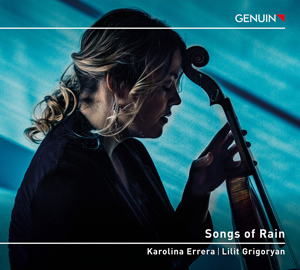Violists often venture into the richly varied realm of transcriptions when looking for new repertoire. While original works for viola are more common these days, there is a wealth of older material, much of which was originally written for violin or cello (always more popular with composers since the invention of the solo virtuoso performer), that translates relatively easily into the viola’s domain–and to many ears, more gratefully so, with its warm timbre and naturally engaging alto/tenor register.
This well-programmed and easily listenable recital from violist Karolina Errera and pianist Lilit Grigoryan features examples of both a familiar original work for viola–Benjamin Britten’s Lachrymae–and a transcription of a substantial violin piece by Brahms–the Violin Sonata No. 1 in G major Op. 78. Filling out the disc are several transcriptions of individual songs, by Tchaikovsky (No. 4, from 6 Romances Op. 6), Rachmaninov (No. 3, from 6 Romances Op. 4), and Brahms (“Nachklang”, from Op. 59). We also hear Vadim Borisovsky’s viola/piano transcription of “Death of Juliet” from Prokofiev’s Romeo and Juliet Op. 64.
The disc’s title, “Songs of Rain”, has nothing overall to do with the program–it’s only connection is to the final work, Brahms’ so-called “Regensonate”, originally for violin and piano (for which he employed the melody from his song “Regenlied”). Here is one of those transcribed pieces that for many listeners will sound better in the viola’s voice–and here the original key is retained, which is important for optimizing the tonal relationships and clarity of texture between piano and viola. Another transcription, which shifts the key to D major (which you will find on some other recordings), suffers from textural issues in the lowered piano part. Errera and Grigoryan are fully involved in the richness of Brahms’ textures, and Errera always makes sure to exploit the full range of color, expressive phrasing, and character of her instrument, its voice capable of reaching into the most engaging territory of both cello and violin.
Together they play the songs with the sensitivity of singer and like-minded keyboard collaborator, and overall we get a sense of a very carefully selected and organized presentation by two accomplished artists who simply enjoy playing together. There is nothing exceptionally flashy or virtuosic here (aside from the not inconsiderable demands of the Brahms), but that’s not the point. For me, it is hearing the special voice of the viola, in varied but compatible musical settings, performed with style, elegance, and expressive ease. My only complaint is the lack of citations for most of the transcriptions.
































